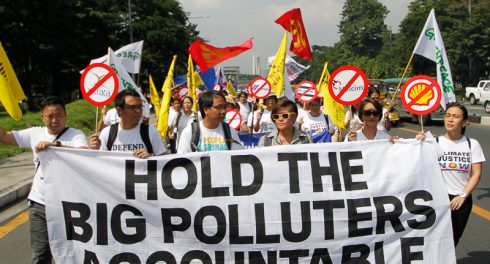Get yourself ready for two weeks of Summit for Democracy via the latest Weekly ranging from co-governance concepts to private equity risks to positive signs on AI design to the manipulation of investor-state dispute settlements.
Plus, a host of new tools, research, jobs, events and the latest commitments from our TAI members.

Highlights
- The Summit for Democracy is here!
- TAIRecommends
- Getting tech to work for us
- A booster for governance?
- Deal of the century, mine rumblings, land governance profiled and following donor money
- Working politically, equitable evaluation and community policing – three useful insights for donors and practitioners alike
- TAI spotlight
The Summit for Democracy is here!

Is collaborative governance the way to revive democracy? Hollie Russon Gilman makes the case for “co-governance—a democratic process through which residents and the government share in decision-making power to achieve common goals.”
That message is likely to resonate with Heather Hurlburt and Alexandra Stark who detail ways that mayors are having success in upholding democracy including civic engagement, transparency, networking, and participatory budgeting.
A new tool from the International Forum for Democratic Studies aims to aid understanding of anti-democratic forces, cataloguing research and reporting on authoritarian “sharp power” in five sectors: media and information; commerce; culture and entertainment; knowledge generation; and technology.

Image credit: Sharp Power
Some of that authoritarian reach is enabled by gaps in democratic country governance systems. Take the example of US private equity – a new FACT coalition report highlights how gaps in anti money laundering frameworks allow it to hide and launder the proceeds of corrupt and criminal activity, undermining national security.
Before we forget! Have you already registered for TAI cohosted session on Does the OGP model work? This session will introduce insights from an OGP evaluation funded by TAI members.
Next December 14, 11 am ET / 8 am PT
Register here
#TAIRecommends
Read about the participatory construction of a model of Citizen Surveillance implemented by Quechua women leaders in Peru. Ariel Frisancho and Luz Estrada share learnings of this experience aimed to “hold health authorities and facility managers accountable, making sure that poor, rural women were receiving the kind of health care services they were entitled to and that they were treated properly.” (Also, available in Spanish)
If you have an interesting piece to flag, tag @TAInitiative on Twitter or use the hashtag #TAIRecommends in your social media posts.
Getting tech to work for us, algorithmic transparency and avoiding racist visualizations
What of big tech ethics? Last year we covered how AI researcher Timnit Gebru was fired by Google. Now she is launching the Distributed Artificial Intelligence Research Institute (DAIR) with support of TAI members MacArthur Foundation, Ford Foundation and Open Society Foundations. DAIR aims to both “document harms and develop a vision for AI applications that can have a positive impact on marginalized groups.”

Image credit: Wired
Natalia Domagala draws our attention to the importance of “openness about the purpose, structure, and underlying actions of algorithms used to process information.” She details how the UK is strengthening algorithmic transparency from the first-hand experience of the Central Digital and Data Office.
How to advance equity and inclusion through data? Alice Feng and Jonathan Schwabish offer some guidance on how to do no harm in data visualizations.
A booster for governance? – prospects of a new pandemic accord and documented procurement issues
The pandemic has revealed many governance gaps at global and national levels, but Amy Maxmen hopes that signs of a potential new global pandemic accord could provide a means to hold countries accountable for pandemic actions.
Meantime, a U4 report demonstrates how corruption has affected the quality and integrity of medical products and impacts on the Covid-19 response. Stay tuned for a TAI piece on ways TPA approaches can reinforce pandemic responses.
Watch this!

Join this Fireside Conversation organized by Funders Organized for Rights in the Global Economy to hear how leading philanthropic actors view the past decade of action on business and human rights and future orientations.
Deal of the century, mine rumblings, land governance profiled and following donor money
Impressive investigative work from The Sentry uncovers state capture and bribery in Congo’s “deal of the century.” No time to read the whole report? – get the headlines and engage on the debate via this Twitter thread.
Building on this investigation and the problems around cobalt covered in our last Weekly, intriguing to see Democratic Republic of Congo President Felix Tshisekedi announce a shake-up at state mining company Gecamines, replacing board chairman Albert Yuma, a close ally of his predecessor and long subject to question marks.

Image credit: Publish What You Pay
Publish What You Pay is pushing for civil society to focus on extractive industry procurement as a way to increase transparency and achieve social and economic benefits, while Maria Rocha, Martin Dietrich Brach, and Tehtena Mebratu-Tsegay examine the risk that investor-state dispute settlement (ISDS) provisions undermines the role of domestic courts, weaken them over the long term, and create parallel and unequal systems of law, undermining the rule of law.
Land Portal released 35 new country profiles – from Somalia to Singapore – revealing cross cutting land governance issues. (Useful reading following an EITI session this past week on renewables governance where land rights and governance were front and center.)
A new report from Carbon Switch highlights how environmental funding may be going to the wrong organizations – groups with explicit aims to reduce emissions only see 16% of funding.
Meantime in the philanthropic infrastructure front, exciting to learn of a new initiative that brings together independent socio-environmental funds in the Global South: Alianza Socioambiental Fondos del Sur.
Essential listening!

ICYMI – the first new Labor Link Podcast with Sawit Kaewwan: Anti-trafficking initiatives must move beyond victim-centered approaches to address forced labor and towards support for migrant workers’ right to organize.
Working politically, equitable evaluation and community policing – three useful insights for donors and practitioners alike.
As a follow up to last week’s piece on 20 years of governance programming in Nigeria, Alina Rocha Menocal and Tom Aston dig in on what it tells us about thinking and working politically

Image Source: Compartir Palabra Maestra
That funders need to really listen to what grantees and communities need is a no-brainer. However, deterministic approaches to development interventions still prevent greater community impact. Arturo García shares highlights around advancing equitable, respectful and culturally responsive data collection, evaluation and work on the ground in community and with non-profits.
Poorly designed police engagement with communities does not increase trust in the police nor reduce crime. Don´t miss this report from Science on community policing and the findings on its implementation in six Global South countries.
TAI spotlight
Open Society Foundations and Ford Foundation sign on to a joint statement calling for action on inequity in vaccine access that is leading to the emergence and circulation of dangerous variants, i.e. Omicron.
MacArthur Foundation shares the results from two surveys conducted with Harris Poll suggesting that framing shared goals with community-focused similarities can help Chicagoans find common ground.
Luminate share fascinating learnings from their “Wellness Stipend” program
Jobs at TAI members
Job postings at Hewlett Foundation – Ongoing
Job postings at MacArthur Foundation – Ongoing
Job postings at Open Society Foundations – Ongoing
Job postings at Luminate – Ongoing
Job postings at Ford Foundation– Ongoing
Job postings at FCDO – Ongoing
Job listings
Principal Governance Expert: Anti-Money Laundering, Counter Terrorist Financing, and Illicit Financial Flows at African Development Bank – December 25, 2021
Associate Director, Innovation Lab at Human Rights First– January 10, 2022
Director, Innovation at Enel Green Power – January 27, 2022
Jobs at Conservation Jobs – Ongoing
Jobs at The Sentry– Ongoing
Jobs at National Democracy Institute– Ongoing
Jobs at l-APS- Ongoing
Donor Finance & Compliance Manager at The Fund for Global Human Rights – Ongoing
Calls/Opportunities
World Justice Challenge – December 10, 2021
Board of Trustee at Integrity Action – December 31, 2021
Entries are open for the 2022 Sigma Awards – January 7, 2021
RightsCon call for Proposals for 11th Summit Series– January 13, 2022
West Africa Civil Society Institute (WACSI) call for papers and articles – Open year-round
Free digital security training– Ongoing
Call for proposals: Informality, tax, and the state – Proposals accepted on a rolling basis
Calendar
Pre-Summit OGP Thematic Events – December 6,7 and 13, 2021
CoST at the US Democracy Summit: Building back with integrity– December 8, 2021
Political Polarization and Municipal Government Accountability during the COVID-19 Pandemic in Mexico – December 8, 2021
The Summit for Democracy – December 9-10, 2021
Open Government Partnership Global Summit – December 13-17, 2021
Evaluating the OGP: Does the model work? – December 14
Annual Anti-Corruption Lecture by leading anti-corruption advocate Dr. Ngozi Okonjo-Iweala– December 15, (18:30 GMT)
International Convention on Anti-Corruption, Good Governance, and Human Rights – April 21-22, 2022 (Boston, MA)


